 Into the Riverlands (The Singing Hills Cycle, #3) by Nghi Vo
Into the Riverlands (The Singing Hills Cycle, #3) by Nghi Vo Narrator: Cindy Kay
Format: audiobook, eARC
Source: purchased from Audible, supplied by publisher via Edelweiss
Formats available: hardcover, ebook, audiobook
Genres: fantasy
Series: Singing Hills Cycle #3
Pages: 112
Length: 2 hrs 21 mins
Published by Tantor Audio, Tordotcom on October 25, 2022
Purchasing Info: Author's Website, Publisher's Website, Amazon, Barnes & Noble, Kobo, Bookshop.org, Better World Books
Goodreads
Wandering cleric Chih of the Singing Hills travels to the riverlands to record tales of the notorious near-immortal martial artists who haunt the region. On the road to Betony Docks, they fall in with a pair of young women far from home, and an older couple who are more than they seem. As Chih runs headlong into an ancient feud, they find themselves far more entangled in the history of the riverlands than they ever expected to be.
Accompanied by Almost Brilliant, a talking bird with an indelible memory, Chih confronts old legends and new dangers alike as they learn that every story-beautiful, ugly, kind, or cruel-bears more than one face.
My Review:
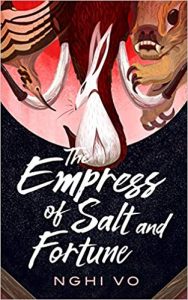 The entire Singing Hills Cycle is a story about stories; the collection of them, the interpretation of them, and especially the way in which that interpretation changes over time as those stories fade in and out of conscience and memory.
The entire Singing Hills Cycle is a story about stories; the collection of them, the interpretation of them, and especially the way in which that interpretation changes over time as those stories fade in and out of conscience and memory.
Cleric Chih has come to the Riverlands to learn what the Riverlanders themselves have to say about the many, many martial arts legends that once walked the Riverlands, only to find themselves in the middle of one.
Or perhaps two. Or even an infinite number of interpretations of the very same one.
Chih, with their friend, mascot and memory recorder, the neixin bird Almost Brilliant, are on the road to Betony Docks, intending to wind their way home to Singing Hills to deliver their report of the stories and legends they have found along their most recent journey.
It’s who they are. It’s what they do. It’s what Singing Hills is all about.
Chih sees the opportunity to travel with the young martial arts master Wei Jintai, her sworn sister Mac Sang, and the middle-aged couple Lao Bingyi and Mac Khanh as a way of traveling the rather dangerous road through the Riverlands in somewhat greater safety while taking the opportunity to hopefully learn some new stories to take home.
However, the stories come to life – and death – as they travel into the lands of the Hollow Hand sect of bandits, thugs and marauders. The Hollow Hand is supposed to have been wiped out long ago, and the martial heroes who did the wiping, Wild Pig Yi and Gravewraith Chen, are assumed to be long dead.
But legends never die. Sometimes they don’t even fade away. They just become different legends. Over and over and over again. Even as they hide in plain sight and boss everyone around.
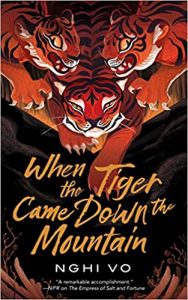 Escape Rating A+: At first, Into the Riverlands seems as if it’s a play on the Canterbury Tales, with Cleric Chih taking the place of Geoffrey Chaucer himself (who, come to think of it, by certain definitions was himself a ‘cleric’). Into the Riverlands is a journey, and every person in the party has at least one story to tell. It’s Chih’s duty to record those stories – not to become a part of one themselves.
Escape Rating A+: At first, Into the Riverlands seems as if it’s a play on the Canterbury Tales, with Cleric Chih taking the place of Geoffrey Chaucer himself (who, come to think of it, by certain definitions was himself a ‘cleric’). Into the Riverlands is a journey, and every person in the party has at least one story to tell. It’s Chih’s duty to record those stories – not to become a part of one themselves.
Which most definitely doesn’t stop that from happening anyway.
It’s pretty clear from the beginning of their trip that Lao Bingyi and Khanh are more than they seem – a devoted middle-aged married couple where the wife knows everyone and everything and can’t stop from bossing people around and telling them all about themselves, while her husband is a man of few words who indulges her every whim.
And that portrait is manifestly true – while still only being one face that they wear. It’s who people expect them to be at this point in their lives. But it’s not who they have been, or even who they ARE. Those are faces they reveal only in part, and only when they must.
It’s only when the crisis comes upon them – or they come upon it – that Chih gets a glimpse of those true faces, and even those are masks that conceal one or more truths that they are not ready to reveal – if they ever will be.
It’s as though Li Mu Bai and Yu Shu Lien, the protagonists of the film Crouching Tiger, Hidden Dragon, had managed to survive their tragic story and outlive their legends into middle age. If they had, or if their tragic ending was either smoke and mirrors on their parts or literary license on the part of some chronicler, they might have become Mac Khanh and Lao Bingyi. And perhaps they did.
Certainly Lao Bingyi lies at the heart of a whole host of tales that Chih gets the barest glimpse of and is informed in no uncertain terms that it’s all they are entitled to get. That the story is hers and not theirs and NOT the Singing Hills Abbey’s.
And that’s the right ending of this tale, which was lovely in the telling even if a bit nerve-wracking for the participants in the doing.
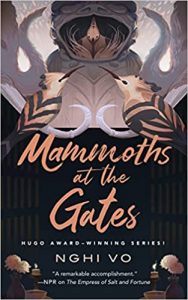 But, as I said in last week’s review of Mammoths at the Gates, throughout the Singing Hills Cycle Chih has been moving steadily from the periphery of the story to the center of the narrative. Their own story is in Mammoths at the Gates, and it was marvelous to finally see their perspective on their own world rather than merely being a witness and recorder to others.
But, as I said in last week’s review of Mammoths at the Gates, throughout the Singing Hills Cycle Chih has been moving steadily from the periphery of the story to the center of the narrative. Their own story is in Mammoths at the Gates, and it was marvelous to finally see their perspective on their own world rather than merely being a witness and recorder to others.
I read Into the Riverlands before it came out in 2022 for a Library Journal review and loved it at the time but didn’t take the opportunity to write it up for Reading Reality while it was still fresh in my memory. After re-reading Mammoths at the Gates last week in the same circumstance, I wasn’t ready to leave Chih’s world and decided to take a trip back through audio. It seemed appropriate as the stories that Chih records are stories that they are being told and I wanted to experience them the same way.
I’m very glad I went back, as Into the Riverlands made an excellent audiobook, thanks to the expert narration of Cindy Kay. And the story had added depth and meaning after reading Mammoths at the Gates and exploring the neixen birds in general, and Almost Brilliant in particular, in a story that better showcased her talents and personality. On the whole I enjoyed this book even more the second time around, to the point where it’s making me think I might want to pick up the audiobooks for the first two books in the series, The Empress of Salt and Fortune, and When the Tiger Came Down the Mountain, and go all the way back to the very beginning!
One final note in reference to the ‘neixin’ and the audiobook. The thing about reading without hearing the words is that you learn how to spell words like ‘neixin’ without knowing how they sound. Listening to an audiobook is the reverse, in that you hear the word without knowing how it’s spelled (which can be frustrating when writing a review!) ‘Neixin’ does not sound at all like I thought it did, and I’m glad to sit corrected.
So reading/re-reading the Singing Hills Cycle has been lovely, and I’m already looking forward to the next book in the series, The Brides of High Hill. But listening to the story, as I think it’s meant to be told, has been a delight.

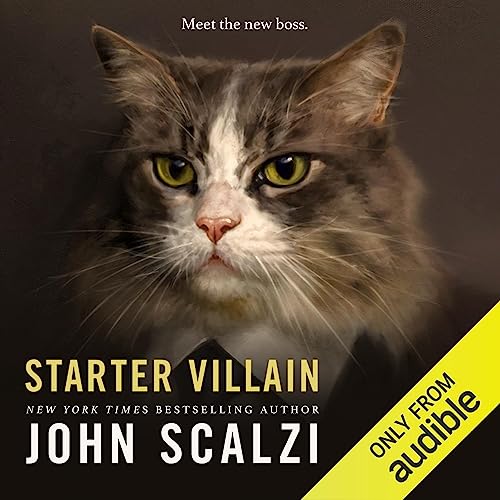 Starter Villain by
Starter Villain by 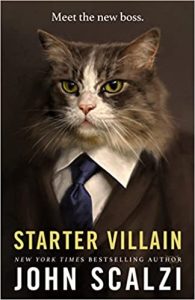 Escape Rating A: Charlie starts out Starter Villain in WAY, WAY over his head. Part of his charm is that he never loses sight of that fact. He’s always aware that he hasn’t got a clue, and isn’t likely to get one any time soon, and is secretly panicking about it every other minute. Which is a big chunk of why we like him and end up rooting for him so hard, because his inner voice is asking the same questions that a lot of us would be asking in his place.
Escape Rating A: Charlie starts out Starter Villain in WAY, WAY over his head. Part of his charm is that he never loses sight of that fact. He’s always aware that he hasn’t got a clue, and isn’t likely to get one any time soon, and is secretly panicking about it every other minute. Which is a big chunk of why we like him and end up rooting for him so hard, because his inner voice is asking the same questions that a lot of us would be asking in his place.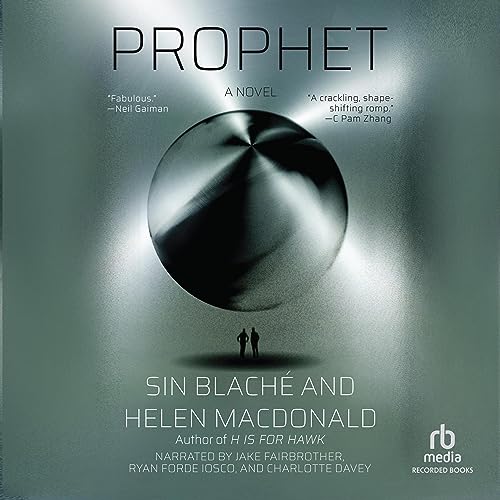 Prophet by
Prophet by 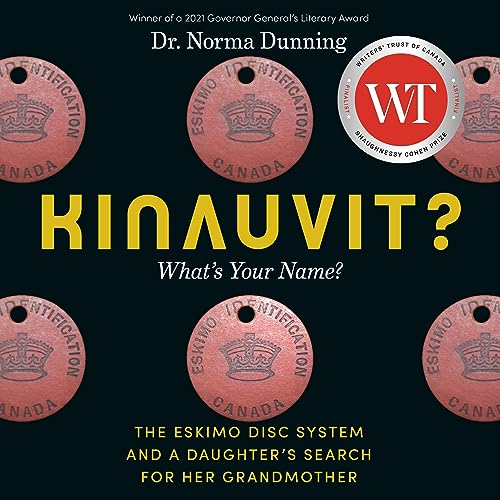 Kinauvit?: What's Your Name? The Eskimo Disc System and a Daughter's Search for her Grandmother by
Kinauvit?: What's Your Name? The Eskimo Disc System and a Daughter's Search for her Grandmother by  Wild Spaces by
Wild Spaces by 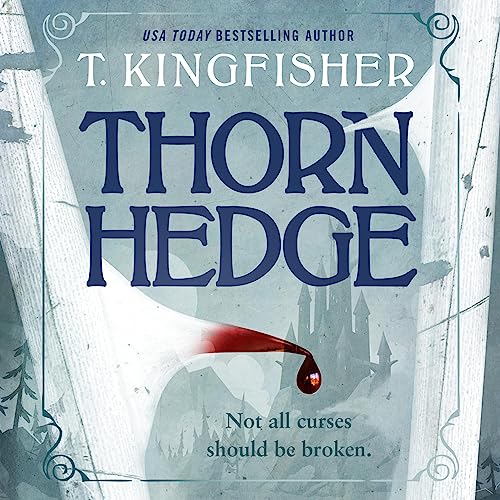 Thornhedge by
Thornhedge by 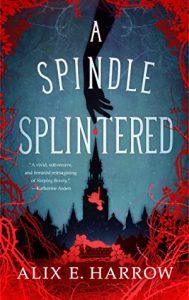 Escape Rating A: Thornhedge is a fractured fairy tale. In fact, Thornhedge and
Escape Rating A: Thornhedge is a fractured fairy tale. In fact, Thornhedge and 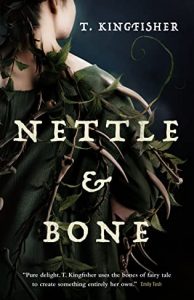 Or in my case, reread.
Or in my case, reread. 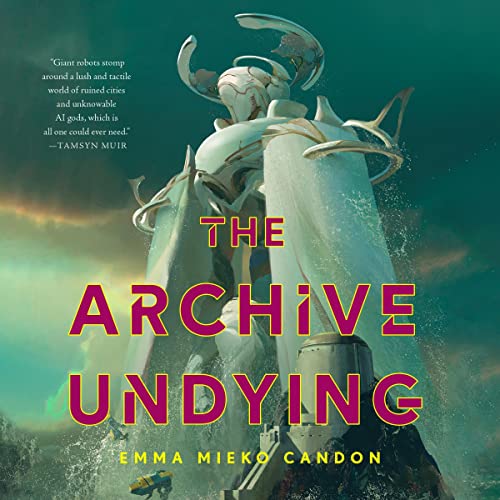 The Archive Undying (The Downworld Sequence, #1) by
The Archive Undying (The Downworld Sequence, #1) by 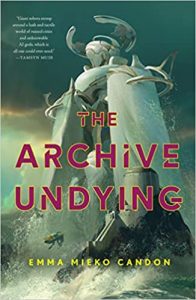 Escape Rating B: I listened to The Archive Undying in its entirety, and I have to say that its the narrator that carried me through all SIXTEEN AND A HALF HOURS. The narrator didn’t just do a good job of voicing all the many, many characters, but by literally being in their heads and not my own it allowed me to care enough about the individuals to be willing to experience the whole constantly twisting saga. If I’d been reading this as text, if I’d been in my head instead of theirs, I’d have DNF’d fairly early because the sheer number of changes in perspectives combined with unsatisfying hints of the world they occurred in would have driven me mad in short order. YMMV.
Escape Rating B: I listened to The Archive Undying in its entirety, and I have to say that its the narrator that carried me through all SIXTEEN AND A HALF HOURS. The narrator didn’t just do a good job of voicing all the many, many characters, but by literally being in their heads and not my own it allowed me to care enough about the individuals to be willing to experience the whole constantly twisting saga. If I’d been reading this as text, if I’d been in my head instead of theirs, I’d have DNF’d fairly early because the sheer number of changes in perspectives combined with unsatisfying hints of the world they occurred in would have driven me mad in short order. YMMV.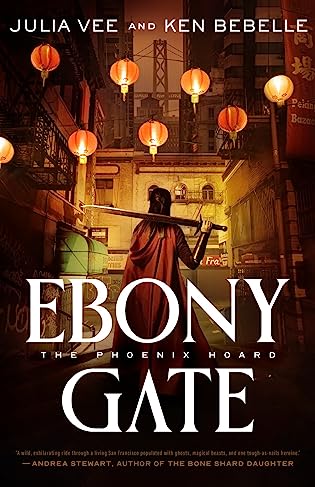 Ebony Gate (Phoenix Hoard, #1) by
Ebony Gate (Phoenix Hoard, #1) by 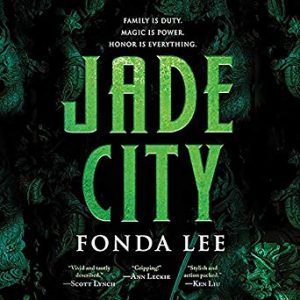 (There are also touches (or more) of
(There are also touches (or more) of 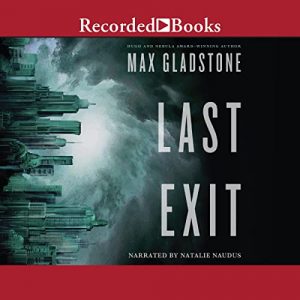 That being said, I want to give a big shoutout to the narrator, Natalie Naudus, who also narrated Max Gladstone’s
That being said, I want to give a big shoutout to the narrator, Natalie Naudus, who also narrated Max Gladstone’s 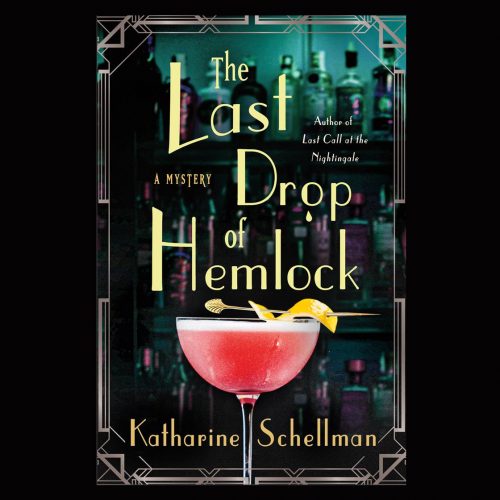 The Last Drop of Hemlock (Nightingale Mysteries, #2) by
The Last Drop of Hemlock (Nightingale Mysteries, #2) by 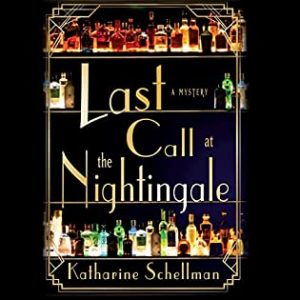 Escape Rating B: As I was listening to The Last Drop of Hemlock, I remembered what I wrote about the first book in this series,
Escape Rating B: As I was listening to The Last Drop of Hemlock, I remembered what I wrote about the first book in this series, 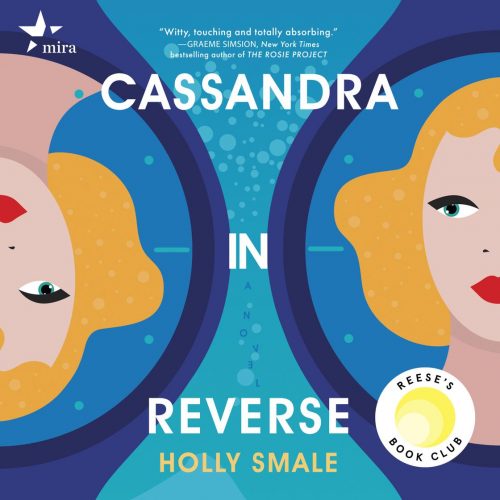 Cassandra in Reverse by
Cassandra in Reverse by